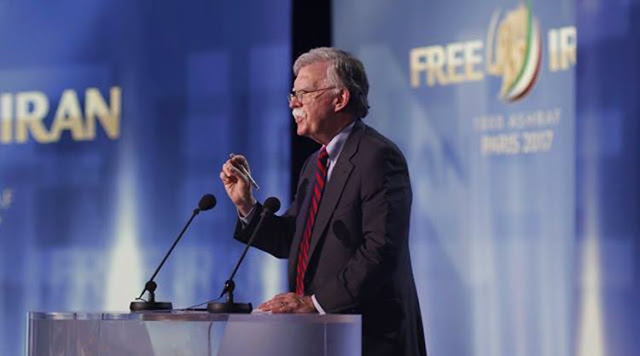NCRI Staff
NCRI - Donald Trump’s appointment of former US Ambassador to the UN John Bolton as national security advisor has been the subject of much criticism recently because many believe that Bolton will put Trump on a path to war with Iran.
Those people are missing one important fact: Iran is already at war with the West. In fact, by causing so much conflict across the Middle East (i.e. Yemen, Iraq, and Syria), Iran is already jeopardising American security interests.
So it makes sense for the US to send a strong message to Iran about their nuclear pursuits and other malign activities to actually reduce the likelihood of another American war in the Middle East. That is Bolton’s appointment does.
If you don’t want an all-out war with Iran, then you need to support Bolton’s appointment as the White House attempts to confront Iran’s destabilisation of the Middle East.
After all, the current assertiveness of the US has already given small victories. For example, there have been no reports of the Iranian Revolutionary Guard Corps (IRGC) menacing the US Navy in the Persian Gulf for seven months now and they were incredibly common before that.
The US must do more to stand up to Iran’s meddling, such as its support of Bashar al-Assad in the Syrian Civil War or its support of terrorist organizations, like Hezbollah. This is why the force from the US must remain strong and why Bolton needed to be appointed.
Another factor that will help to bring about the downfall of the Regime without US military intervention is the popular people’s uprising in Iran when the citizens are demanding regime change.
The Regime has cracked down violently on the protesters with at least 50 shot dead in the streets, 8,000 arrested, and 14 who died under torture in prison. Still the people are continuing their protests.
The Iranian people and their organised, democratic resistance coalition, the National Council of Resistance of Iran (NCRI), can overthrow the mullahs without the need for a foreign war by the US.
Ivan Sascha Sheehan, the incoming executive director of the School of Public and International Affairs at the University of Baltimore, wrote on The Hill: “The only way to remove the spectre of war is to end the regime in Tehran. And the only means of striking a fatal blow to the regime is by supporting the organized uprising by the Iranian people.”
What the Iranian people need from the US instead is political support, like providing free uncensored internet and voicing support for the protesters. This will let them know that the world supports their cause.
Bolton, already a friend of the Iranian Resistance, supports regime change by and for the people of Iran. He will only encourage the US further along this path.




Comments
Post a Comment